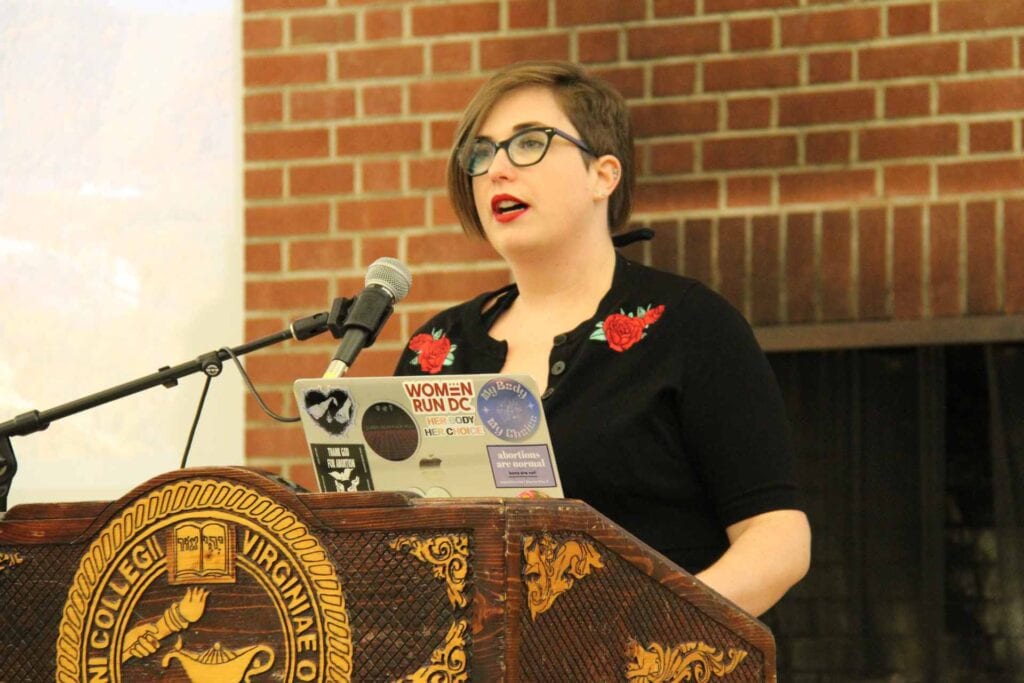BUCKHANNON – Two West Virginia Wesleyan College alumni discussed the resources for women’s health care available in West Virginia during a discussion held to note the 50th anniversary of Roe v. Wade.
The college invited students and the local community to an informational gathering in the WVWC Social Hall on Thursday, Jan. 26, to hear from the speakers about abortion, healthcare and the history of Roe. v. Wade.
Ramsie Monk with the Women’s Health Center of West Virginia said the center is still open and offers several services to residents of West Virginia.
“For nearly 50 years, we were our state’s only abortion provider,” said Monk, who is a graduate of West Virginia Wesleyan College. “Last year in September we lost access to abortion here in our state, but do not fear, the Women’s Health Center is not going anywhere. We didn’t just provide abortion care, we provided a surplus of different reproductive health care options, including but not limited to gynecological care. You can come and get your wellness exams, you can get STI testing and treatment, you can get gender-affirming care, which includes HRT and prep, you can come and get breast and cervical cancer screenings. We also have a pregnancy support service for mothers who are young, who are low income or noninsured, and infants up to age one.”
Another Wesleyan alumni, Amber Pugh with the National Abortion Hotline, explained the purpose of the hotline and noted that anyone can utilize their services.
“The National Abortion Federation is a network of independent abortion providers,” Pugh said. “Everybody knows about Planned Parenthood, but Planned Parenthood is not the only abortion provider. There are a set of independent clinics as well. We vet clinics for safety and quality, and those are the only centers that we refer to our members, because we think it’s really important that people are able to get safe, compassionate care. They need information about referrals to health centers, information about how to pay for abortion, about how to travel, how to book travel.”

A person looking to utilize their services can call the hotline number at 1-800-772-9100 and then operators will determine the best strategy moving forward.
“You call that number and get connected with a hotline intake counselor who does an initial needs assessment,” Pugh said. “Some people’s needs are met at that level, and if you have more needs, you can be connected with a case manager for more in-depth assistance. Our goal is to help people navigate all these barriers and to find care as best as we can. We provide financial assistance, practical support, education and emotional support. We work alongside a large network of locally based abortion funds, and we are not the only one. It takes a village to help people access abortion, especially right now because of all the obstacles that people are facing.”
Pugh said it has become a challenge for people to seek care because of the stigma surrounding abortions.
“Many of these obstacles are medically unnecessary, state-imposed requirements,” she said. “Some examples of these include requiring minors to obtain consent and notification to have an abortion, unnecessarily requiring multiple appointments, mandatory waiting periods, price, and counseling … Abortion is not a dirty word, it is healthcare.”
Pugh talked about trying to break the stigma and discussed the various reasons a person might need an abortion in 2023.
“There’s no right or wrong reason to have an abortion,” she said. “The people I serve every day are survivors of domestic violence who want to try to escape the cycle of abuse. They are substance users, who want to get into treatment programs that won’t accept them if they’re pregnant. They are people who are starting jobs in the military that won’t accept them if they’re pregnant. They are people who are experiencing homelessness who want to get to a shelter that won’t accept them if they’re pregnant, and people who have deadly and debilitating diseases like cancer and sickle cell who won’t get care if they’re pregnant — doctors will not offer them the care that they need to save their life because they do not want to risk the pregnancy.
“They are people who are grieving the death of their partners, people who had just given birth to infants and can’t physically handle another pregnancy, people who very much want to continue their pregnancy but have fetal anomalies and think this is the most compassionate decision for them, and people who are in college they want to focus on their education.”
Anyone looking for help within the state can contact the Women’s Health Center at (304) 344-9834, Monk added.
“Call the Women’s Health Center and we will get you plugged in, especially if you’re a West Virginia resident, money is available for you to get the care that you need,” Monk said. “Something that I wanted to mention because I’ve gotten this question tonight: Plan B is not illegal, you can take it, you can buy it, you can get it over the counter.”













